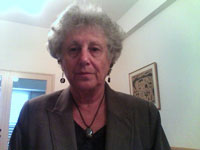On Sexual Agency
I wish to use this opportunity to reflect upon the current attitude of the relational movement with regard to sexuality as an integral aspect of our life. Although in the 1990s it started with great courage to inspect and incorporate sexuality in its many manifestations and the issues of erotic transference and countertransference in the barren analytic treatment of the time, I am afraid that the spirit has aged to become desexualized too soon (as may be learned, among other sources, from the IARPP Colloquium “The Black Man and the Mermaid: Desire and Disruption in the Analytic Relationship”, October, 2012). As I have been studying the status of sexuality in psychoanalysis for years and am trying to amend it, I take the liberty to briefly survey it in order to regard its current relational pitfalls, as I see them. It is especially needed in today’s world where sexuality is not only a basic human motivational source, but it has gained displayed manifestations which require psychoanalysts to be at ease and of experience with regard to it in order not to be left out of today’s reality.
When psychoanalysis emerged, sexuality was its major interest and focus, to hand it over both to those practicing within the ego psychology perspective and within French psychoanalysis. The Anglo-American psychoanalytic world has turned desexualized under the influence of the object-relations school, as the ‘mother-child dyad’ has gained focus and human and relational issues such as dependence, meaning and subjectivity have gained dominance at its expense. Although there were always voices of psychoanalysts to preserve interest in sexuality, it was the 1990s when a general outcry came from various directions: Psychoanalytic Dialogues became an arena for major discussions of sexuality and gender to surface, manifesting open disclosure of analysts on the clinical material presented. In 1996 the French analyst Andre Green wrote “Has sexuality anything to do with psychoanalysis?” to point out the massive avoidance of sexual matters in analytic practice, and regard it, at best, in the service of supposedly more basic relational needs.
However, not only has psychoanalysis turned desexualized, but the outer world has seem to become over-sexualized, or at least freer in some respects: women more often take ownership over their sexual desire while internalized past feminine roles confuse their feelings and behavior; adolescents start their explorations at an earlier age with no adequate guidance while becoming technological experts, less dependent on adults; no commercial passes without a sexual reference, while forming distorted models without experienced intimacy, etc. In such discrepancy between the psychoanalytic world and the outside world, patients (even professionals) complain that their sexuality did not come up in their treatments, and even freer analytic representatives withhold sexual issues.
What was of interest in the October 2012 IARPP-Colloquium was the willingness of a colleague to bring openly clinical material with erotic overtones between a female patient and a female analyst. I was surprised that the relational spirit of the 1990s, that had nourished many of us on such matters, did not surface automatically in the delivery, to demonstrate that the relational school has remained “sexual” – free enough and vocalized on these matters in its training of the coming generations of analysts. It saddened to see that the sexuality of the analyst could still be taken as a performance that a woman analyst has to be free to perform (by choosing sexy clothes), instead of viewing our visibility as embedded in the analytic relationship and within our agency. This means the acceptance of (and the struggle with) our total subjectivity including as a sexual being, along the basic relational spirit. The 1990s were remembered in the colloquium as “references”; not as a live spirit but as: “did you read…?”. It was also saddening to learn how fast the initial enthusiasm and appreciation of the topic faded out: instead of generating more and more personal vignettes, as the tradition is in these forums (for example, personal vignettes with regard to the holocaust and other mass traumas), the discussion kept the enthusiasm but about general theoretical issues and of race and social matters.

Nitza Yarom, PhD – Tel Aviv, Israel
My concern is that psychoanalysis has become a territory of Puritanism, even when occasional outbursts to break away from it take place. The relational school was young in spirit only twenty years ago in dealing openly with sexuality and sexual agency. But now, when the world is sexual not in given behaviors but as part of life and leisure, and people need our insight to safeguard a subjective core in a free bodily-social meeting – those who are to help, may be dried up too soon. It is in psychoanalysis’ basic make-up that which can keep this aspect alive.


